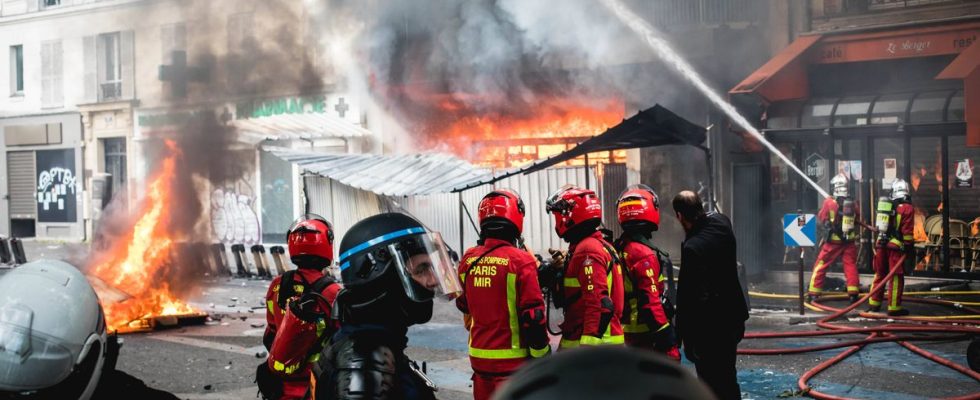In the ranks of the police, the spirits are still very marked by the violence which enamelled the demonstrations of May 1st. A CRS received a Molotov cocktail, which seriously burned him in the face, boulevard Voltaire, in Paris. Like him, 406 police and gendarmes, who faced thugs and black blocks for nearly four hours, were injured that day in France and 31 were hospitalized. “The demonstration was shocking because the violence went to another level, police officers still suffered homicide attempts,” laments Linda Kebbab, national delegate of the SGP Police FO Unit union. The Paris prosecutor’s office has indeed opened an investigation in these terms after the molotov cocktail was thrown at a police officer.
The police “are trying to stem exponential violence directed against citizens, property and institutions, but above all against them”, denounce several trade union organizations, including Alliance, in a letter addressed to the head of the ‘State. Their representatives are received this Friday and Monday at the Élysée by Patrick Strzoda, Emmanuel Macron’s chief of staff. Their objective: to obtain “Immediate strong gestures”, and in particular a new “anti-breaker” law.
“There are lines of thought”
The Minister of the Interior has already deemed that a new text was necessary. Gérald Darmanin spoke about it last Friday with his Justice counterpart, Éric Dupond-Moretti. “There are avenues for reflection but it is still a little early. You have to know exactly what is in the existing law, what is applicable or not, and see how the text can be improved, ”says those around the Keeper of the Seals. And to add: “When we see the images of May 1, it is normal to wonder and think about the subject. »
The fact remains that the last law of its kind dates back to April 2019. It introduced the offense of concealing the face without legitimate reason in demonstration and authorized the searches of bags and vehicles, in and around processions. On the other hand, the Constitutional Council had censored the measure allowing prefects to pronounce administrative bans on demonstrations, on the model of administrative bans on stadiums punishing violent football supporters. The Elders considered that this provision violated “the right to collective expression of ideas and opinions” and was “not appropriate, necessary and proportionate”.
“We do not legally need a new law”
For Linda Kebbab, it is nevertheless necessary “to prohibit people who have already exercised violence, breakage or damage, from participating in a demonstration”. On May 1, some 540 people were arrested in France, including 305 in Paris. “But 80 to 90% of people were released” at the end of their police custody, adds the trade unionist, who nevertheless affirms that “people were caught red-handed but were not sentenced”, lack of evidence. Linda Kebbab pleads for a reform of criminal procedure aimed at “avoiding that lawyers get engulfed in procedural defects”.
Thibaut Spriet, national secretary of the Syndicat de la magistrature, is more circumspect on the need for a new law, noting that there are “already many repressive tools in our criminal law which make it possible to repress and punish the perpetrators of offenses in the context of a demonstration”. “There is therefore no legal need for a new law which would be a display law going in the direction of an over-penalization of the maintenance of order”, underlines the magistrate. And the latter to add: “burning a trash can, destroying public property, attacking the police, these are already offenses which can be subject to a sanction intended to deter the perpetrators. The government, he says, is trying to divert attention, with this text, from the “abusive police custody” and “police violence” observed.

